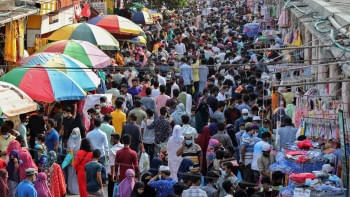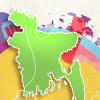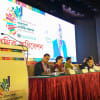Bangladesh needs inclusive data for an equitable future

Today is World Population Day (WPD), and this year's theme is "Embracing the power of inclusive data towards a resilient and equitable future for all." Inclusive data means collecting data for all people, regardless of location, ethnicity, gender, or age. It involves representation, disaggregation, intersectionality of identities, multiple sources, privacy, and support of human resources and technical capacity. It is about closing the data gaps required for a fair and equitable society, and it is more than numbers where every person is seen, heard, and counted.
The key messages for the WPD 2024 as circulated by the United Nations are: (i) in a world of uncertainty and upheaval, we can achieve a peaceful and prosperous future by building resilient systems and societies using evidence-based solutions and reliable, inclusive data; (ii) data collection and analysis tools have vastly improved; yet these changes have also exposed significant information gaps and potential risks, including the misrepresentation or misuse of data; and (iii) countries and societies must champion data collection that counts people as they are, in all their complexity.
This year the world will celebrate the 30th anniversary of the landmark International Conference on Population and Development (ICPD). Since adopting the ICPD Programme of Actions (PoA) in 1994 and the Sustainable Development Goals (SDGs) in 2015, countries worldwide have been developing the necessary statistical data to track the goals and indicators developed by the United Nations. To measure progress of SDGs, inclusive data is crucial to enables us to see where change is required, allowing us to reach everyone and support them in realising their rights. The SDG progress report demonstrates where a country currently stands on inclusive data collection.
The SDG tracker of Bangladesh shows that almost two-third of all indicators used to monitor the 17 SDGs currently should be made available, but only one-third are updated or readily available. It will take less than six years to reach the SDGs benchmark, but more data will be needed—especially disaggregated data for development. More than half of the data are unavailable for specific goals like SDG 12 (responsible consumption and production) and SDG 14 (life below water). The number of updated data was reduced in 2023 but increased in 2024, which needs a causal explanation from the government. The Bangladesh government is implementing the SDGs at the district and upazila levels. The cabinet approved 39+1 priority indicators in 2018 to localise the SDGs because 39 were deemed necessary at the local level in the nation and had reinforcing effects on other targets. Another priority indicator was left in place to ensure that "no one is left behind," aligning with the requirements of a particular district or upazila and considering the specific circumstances of that geographic area. About five of these 39 priority indicators still need to be updated in the tracker. Another issue with this online tracker is that reviewing the data availability status of each goal's indicator can be confusing because the information is not synchronised. Many of the indicators are only partially mentioned. All these problems must be addressed and resolved immediately for this SDG tracker to function correctly.
While improvements in data collection have been made, data gaps have also been exposed. Significant gaps persist in the availability, quality, accessibility, and use of data in Bangladesh. For example, marginalised groups, such as people with disabilities, are not counted accurately in the latest population and housing census in 2022 leading to the possibility that more people will remain invisible to decision-makers. Inclusive data on disability means collecting data primarily on disability, sex, and age and incorporating other dimensions, such as income, ethnicity, location, and other factors. We need to analyse and critically use the data to develop policies to reach those who are most marginalised or are being left behind. The urgency of addressing these data gaps cannot be overstated, as it is crucial for the future of our society.
Another example can be given regarding the accuracy of the maternal mortality ratio (MMR) in Bangladesh, an essential indicator of SDG-3 (good health and well-being). There has been no large-scale maternal mortality and health care survey after 2016. The MMR data, reported from Bangladesh Bureau of Statistics' (BBS) Sample Vital Registration System (SVRS) that records vital events such as births, deaths, and causes of death, does not truly reflect the figure due to a shortage of the required sample size. As a result, reporting the MMR and its disaggregated figure from there for policy design and interventions is not appropriate. Thus, urgent efforts must be made to make quality data for all indicators available through effective multisectoral partnerships, coordination, and integration among stakeholders to strengthen and improve the country's data capacity. Decision-making depends heavily on data; obtaining high quality data is crucial for reaching the SDGs. Bangladesh needs more investment in inclusive data for a resilient and equitable future. Our country faces enormous challenges, but we can tackle them. Strong political commitment and the effective and timely implementation of such commitment are essential. Significant policies related to population and development need to be reformed and updated using the SDGs framework. We should pursue the SDGs and our common agenda, keeping the population and its sub-groups at the development centre. For example, Bangladesh should prioritise data on the most vulnerable communities, like adolescent mothers (ages 15-19), as adolescent childbirth is common in practice (24 percent, Bangladesh Demographic and Health Survey, BDHS 2022).
More robust data systems drive diverse benefits, improving quality of life and livelihoods and leading to greater efficiencies in social programmes. An analysis published in September 2022 by the Global Partnership for Sustainable Development Data states that every dollar invested in strengthening data systems generates $32 in economic benefits. This underscores the potential for significant positive change achieved through strategic investment in data systems. Thus, the United Nations (UN) recommends increasing domestic funding for data and statistics by 50 percent by 2030, along with urging donor agencies to raise the share of official development assistance for data to at least 0.7 percent by 2030.
Although several SDG targets have been partially met, achieving full realisation is essential for expediting overall progress in Bangladesh. A few significant challenges to achieving the SDGs in Bangladesh are the unavailability of baseline data, lack of monitoring, and lack of coordination among the national targets stated in the national policies and the SDG target. Thus, establishing a national data repository or information bank that consolidates relevant data from each concerned organisation is necessary, and it can be linked with the SDGs tracker.
Bangladesh has a population of more than 173 million (SVRS, 2023, BBS). This is a big number with big opportunities, and big challenges. A population of 173 million means there are over 173 million opportunities for a healthier Bangladesh empowered by rights and choices. Adequate and updated population data based on gender, ethnicity, class, religion, disability, etc, are necessary for inclusive development. There is evidence of adopting an inclusive approach to data collection in Bangladesh—data on transgender or Hijra were included in the 2022 Population and Housing Census. The key is to ensure equal access to opportunities and removing barriers to opportunities to harness the potential of all Bangladeshis, including marginalised or disadvantaged populations like women, young people, older people, people with disabilities, and migrants. The best way to cultivate demographic resilience is to support human rights, including individuals' rights and choices—that is the ultimate development.
Dr Mohammad Mainul Islam is professor & former Chairman of the Department of Population Sciences at the University of Dhaka.
Views expressed in this article are the author's own.
Follow The Daily Star Opinion on Facebook for the latest opinions, commentaries and analyses by experts and professionals. To contribute your article or letter to The Daily Star Opinion, see our guidelines for submission.

 For all latest news, follow The Daily Star's Google News channel.
For all latest news, follow The Daily Star's Google News channel. 










Comments